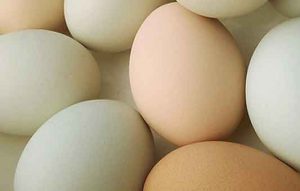 A new epidemiological study conducted by researchers at The Westmead Institute for Medical Research indicates that regular consumption of eggs could reduce the risk of developing age-related macular degeneration (AMD).
A new epidemiological study conducted by researchers at The Westmead Institute for Medical Research indicates that regular consumption of eggs could reduce the risk of developing age-related macular degeneration (AMD).
AMD is a chronic condition affecting the central macula that can cause a progressive loss of central vision.
Age is a risk factor for macular degeneration, with people aged 50 and over most frequently affected.
However, AMD is not a normal or certain part of ageing.
Lead investigator, Associate Professor Bamini Gopinath from the Centre for Vision Research at The Westmead Institute for Medical Research says that, to date, no epidemiological studies have investigated the relationship between total egg intake and the risk of developing AMD.
“The findings of this study are therefore important as they indicate a significant and independent association between the moderate consumption of eggs and lower risk of developing late AMD*.
“Specifically, participants who consumed 2-4 eggs per week versus those who consumed less than 1 egg per week had 49% reduced risk of developing late AMD after 15 years.
“The results were more significant for those participants who developed the ‘wet’* form of late AMD.
In those participants whose age of AMD onset was at the 5- or 10-year follow-up stage of the study, consumption of 2-4 and 5-6 eggs per week was associated with 54% and 65% reduced risk of late AMD, respectively.”
Associate Professor Bamini Gopinath adds, “However, there does appears to be a threshold to the benefit of egg consumption in relation to AMD risk as no added benefit was observed in those who consumed an average of one or more eggs per day.”
The potential protective properties of eggs are in the carotenoids contained in the yolk, particularly lutein and zeaxanthin, which have anti-inflammatory and antioxidant properties.
There is evidence that these macular carotenoids could have a beneficial effect on the progression of AMD.
Associate Professor Gopinath says dark-green leafy vegetables are established as being good sources of carotenoids, particularly lutein and zeaxanthin.
Therefore, all people with AMD, regardless of disease stage, are encouraged to increase their intake of dark green leafy vegetables as part of their regular diet.
Eggs also represent a cost-effective and rich source of dietary lutein and zeaxanthin.
“While eggs contain less lutein and zeaxanthin than dark-green leafy vegetables, lutein and zeaxanthin are better absorbed by the body when sourced from eggs,” says Associate Professor Gopinath.
While this initial study strongly indicates the potential of regular egg consumption to help reduce the risk of AMD, Associate Professor Gopinath encourages more studies to verify these findings.
The study was based on The Blue Mountains Eye Study, a community-based cohort, and involved 3,654 adults aged 49 years and over.
AMD was determined from retinal photographs.
Egg consumption was assessed using a semi-quantitative food-frequency questionnaire.
Total egg intake was calculated through summing up intakes in all forms e.g. boiled, poached, fried, scrambled and/or omelette.
Researchers summarized total egg consumption into the following categories: =1 egg/week; 2–4 eggs/week; 5–6 eggs/week; and =1 egg/day.
Participants who consumed 2–4 eggs/week versus =1 egg/week at baseline had 62% reduced risk of developing neovascular AMD.
Among those whose AMD onset was at or before the 10-year follow-up, consumption of 2–4 and 5–6 eggs/week was associated with 54% and 65% reduced risk of incident late AMD, respectively.
* Late AMD is when vision becomes impaired.
Late AMD can be classified asdry (atrophic) macular degeneration or wet (neovascular) macular degeneration.
For more information
Clinical Nutrition
Consumption of eggs and the 15-year incidence of age-related macular degeneration
Link…
https://www.clinicalnutritionjournal.com/article/S0261-5614(19)30122-0/fulltext
The Westmead Institute
Link…
MDN
This post is also available in:
 Italian
Italian


